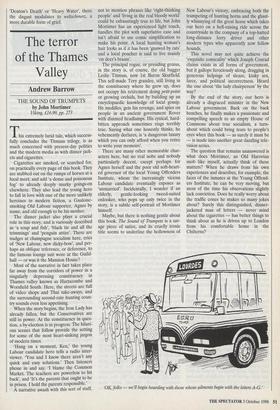The terror of the Thames Valley
Andrew Barrow
THE SOUND OF TRUMPETS by John Mortimer Vikin& L16.99, pp. 273 This extremely lurid tale, which success- fully concludes the Titmuss trilogy, is as much concerned with present-day politics and the modern media as with dinner jack- ets and cigarettes.
Cigarettes are smoked, or searched for, on practically every page of this book. They are stubbed out on the rumps of horses at a local meet, and add 'a dense and poisonous fog' to already deeply murky goings-on elsewhere. They also lead the young hero to fall in love with one of the more unlikely heroines in modern fiction, a Gauloise- smoking Old Labour supporter, Agnes by name, and old enough to be his mother. The dinner jacket also plays a crucial role in this story, and is variously described as 'a soup and fish', 'black tie and all the trimmings' and 'penguin attire'. There are nudges at champagne socialism here, cries of 'New Labour, new dicky-bow', and per- haps an oblique reference, or deference, to the famous lounge suit wore at the Guild- hall — or was it the Mansion House?
Most of the narrative in fact takes place far away from the corridors of power in a singularly depressing constituency in Thames valley known as Hartscombe and Worsfield South. Here, the streets are full of video shops and Thai take-aways, and the surrounding second-rate hunting coun- try sounds even less appetising.
When the story begins, the Iron Lady has already fallen, but the Conservatives are still in power. At the constituency in ques- tion, a by-election is in progress. The hilari- ous scenes that follow provide the setting for some of the most heart-sinking jargon of modern times.
`Hang on a moment, Ken,' the young Labour candidate hero tells a radio inter- viewer. 'You and I know there aren't any quick and easy solutions.' Then listeners phone in and say, 'I blame the Common Market. The teachers are powerless to hit back', and 'It's the parents that ought to be in prison. I hold the parents responsible.' A narrative awash with this sort of stuff, not to mention phrases like `right-thinking people' and 'living in the real bloody world' could be exhaustingly true to life, but John Mortimer has an experienced light touch, handles the plot with superlative ease and isn't afraid to use comic simplification to make his point. A local hunting woman's hair looks as if it has been 'gnawed by rats' and a local poacher is said to live mainly `on deer's brains'.
The principal rogue, or presiding genius, in the story is, of course, the old bugger Leslie Titmuss, now 1st Baron Skurfield. This self-made Tory grandee, still living in the constituency where he grew up, does not occupy his retirement doing petit-point or growing orchids, but by building up an encyclopaedic knowledge of local gossip. He meddles, gets his revenge, and spies on people in an ancient government Rover with dimmed headlamps. His cynical, hard- bitten approach sometimes rings terribly true. Saying what one honestly thinks, he vehemently declares, is 'a dangerous luxury which you can only afford when you retire to write your memoirs'.
There are many other memorable char- acters here, but no real nobs and nobody particularly decent, except perhaps for Agnes herself and the poor old soft-heart- ed governor of the local Young Offenders Institute, whom the increasingly vicious Labour candidate eventually exposes as `unmarried'. Incidentally, I wonder if an elderly, gentle-looking tweed-suited onlooker, who pops up only twice in the story, is a subtle self-portrait of Mortimer himself.
Maybe, but there is nothing gentle about this book. The Sound of Trumpets is a sav- age piece of satire, and its cruelly ironic title seems to underline the hollowness of New Labour's victory, embracing both the trumpeting of hunting horns and the ghast- ly whinnying of the great horse which takes our hero on a hell-raising ride across the countryside in the company of a top-hatted long-distance lorry driver and other modern types who apparently now follow hounds.
This novel may not quite achieve the `exquisite comicality' which Joseph Conrad claims exists in all forms of government, but it gallops ferociously along, dragging in generous helpings of sleaze, kinky sex, farce, and political incorrectness. Heard the one about 'the lady chairperson' by the way?
By the end of the story, our hero is already a disgraced minister in the New Labour government. Back on the back benches, he finally makes a passionate and compelling speech to an empty House of Commons about true socialism, a turn- about which could bring tears to people's eyes when this book — as surely it must be — is made into another great dazzling tele- vision series.
The question that remains unanswered is what does Mortimer, an Old Harovian snob like myself, actually think of these matters? When he draws from his own experiences and describes, for example, the faces of the inmates at the Young Offend- ers Institute, he can be very moving, but most of the time his observations slightly lack conviction. Does he really worry about the traffic cones he makes so many jokes about? Surely this distinguished, dinner- jacketed man of letters — never mind about the cigarettes — has better things to think about as he is driven up to London from his comfortable home in the Chilterns?
`OK folks — we'll begin boarding with those whose ailments begin with the letters A-G.'










































































 Previous page
Previous page